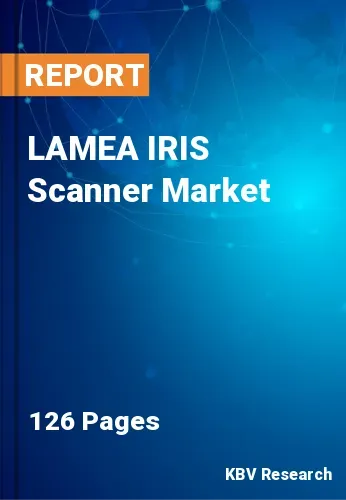The Latin America, Middle East and Africa IRIS Scanner Market would witness market growth of 14.3% CAGR during the forecast period (2023-2030). In the year 2026, the LAMEA market's volume is expected to surge to 658.9 thousand units, showcasing a growth of 15.2% (2023-2030).
Iris scanning technology has gained popularity for security and access control. Many organizations and governments have invested in iris recognition systems to secure access to facilities, data, and devices. Iris recognition is increasingly used in biometric authentication systems, especially smartphones and other consumer devices. This provides a high level of security and convenience for users. Iris scanners are being used in healthcare for patient identification, ensuring the security of electronic health records, and preventing medical identity theft.
The financial sector has explored iris scanning for secure access to accounts and identity verification during high-value transactions. As the Internet of Things (IoT) expands, iris scanners are being integrated into smart devices for user authentication and access control. Iris recognition technology is becoming more accurate, faster, and cost-effective. This has made it more accessible to a broader range of applications. Integrating iris scanning technology with artificial intelligence (AI) and machine learning algorithms allows for more efficient and accurate identification. As smart cities and the Internet of Things (IoT) continue to evolve, iris scanning is being integrated into various IoT devices for secure access and control.
The adoption of iris scanner technology in the automotive sector in Saudi Arabia is increasing, particularly for applications related to vehicle security, access control, and personalized driver experiences. These are integrated into vehicles to provide secure access and ignition control in Saudi Arabia. This technology ensures that only authorized drivers can start and operate the vehicle, preventing theft. As per the International Trade Administration, in 2020, Saudi Arabia accounted for over 52% of the vehicles sold in the Gulf Council Corporation and 35% in the Middle East region. In Saudi Arabia, 556,000 and 436,000 vehicles were sold in 2019 and 2020, respectively. The factors mentioned above will drive the regional market growth.
The Brazil market dominated the LAMEA IRIS Scanner Market by Country in 2022 and would continue to be a dominant market till 2030; thereby, achieving a market value of $150.9 million by 2030. The Argentina market is showcasing a CAGR of 14.9% during (2023 - 2030). Additionally, The UAE market would register a CAGR of 14% during (2023 - 2030).
Based on Component, the market is segmented into Hardware, and Software. Based on Industry, the market is segmented into Consumer Electronics, Military & Defense, Healthcare, Travel & Immigration, Automotive, BFSI, and Others. Based on countries, the market is segmented into Brazil, Argentina, UAE, Saudi Arabia, South Africa, Nigeria, and Rest of LAMEA.
Free Valuable Insights: The Worldwide IRIS Scanner Market is Projected to reach USD 6.4 Billion by 2030, at a CAGR of 10.4%
The market research report covers the analysis of key stake holders of the market. Key companies profiled in the report include Dermalog Identification Systems GmbH, M2SYS Technology, ams-OSRAM AG. eyeLock LLC (VOXX International Corporation), Princeton Identity, Inc., CMITech Co, Ltd., HID Global Corporation (Assa Abloy AB), Thales Group S.A., Iris ID, Inc. and IrisGuard Ltd.
By Component
By Industry (Volume, Thousand Units, USD Million/Billion, 2019-2030)
By Country (Volume, Thousand Units, USD Million/Billion, 2019-2030)

Our team of dedicated experts can provide you with attractive expansion opportunities for your business.

